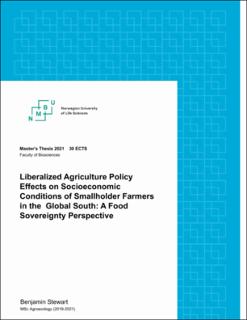| dc.contributor.author | Stewart, Benjamin Charles | |
| dc.date.accessioned | 2021-11-08T12:50:16Z | |
| dc.date.available | 2021-11-08T12:50:16Z | |
| dc.date.issued | 2021 | |
| dc.identifier.uri | https://hdl.handle.net/11250/2828385 | |
| dc.description | Host institution: ISARA-Lyon & NMBU | en_US |
| dc.description.abstract | In the years since the second World War, governments globally have adopted trade and production policies which opened global trade via the relaxation of tariffs through international agreements, both bilateral and multilateral. Concurrently, the Green Revolution accelerated industrialized farming to meet the needs of this newly developed global market. While for many years these systems have been beneficial both socioeconomically and in terms of food security, most of the benefits of this system have gone to high-income nations, while low-income nations lag. Further, benefits once gained from the system have begun to abate; despite the ability for many countries to produce enough calories for their populations, malnutrition and undernutrition rates are on the rise in the global South. This study provides empirical data to illustrate the global trade paradigm from the perspective of 3 lowincome nations (Cuba, Côte d’Ivoire and Kenya) and 2 middle income countries (Brazil and India). I hypothesize that the implementation of liberalized policies, aimed to increase profits in a globalized food chain are detrimental to the socioeconomic condition of smallholder farmers in these low and middle-income countries. Their socioeconomic condition is analyzed in terms of food sovereignty; the traditional definition of food security is insufficient as production is no longer the major issue. Results indicate that policies aimed to liberalize agriculture in low and middle-income countries hamper the development and the socioeconomic standing of smallholder farmers by violating their food sovereignty. Additionally, results suggest that liberalized trade policies specifically seem to have the largest effect. Moving forward, policy recommendations should include the re-orientation of trade policy in the global South, integration of food sovereignty principles into development strategies, and use of agroecological principles to design farming and food distribution methods to achieve the stated development goals. | en_US |
| dc.language.iso | eng | en_US |
| dc.publisher | Norwegian University of Life Sciences, Ås | en_US |
| dc.rights | Attribution-NonCommercial-NoDerivatives 4.0 Internasjonal | * |
| dc.rights.uri | http://creativecommons.org/licenses/by-nc-nd/4.0/deed.no | * |
| dc.subject | Sustainable food systems | en_US |
| dc.subject | Agriculture | en_US |
| dc.subject | International development | en_US |
| dc.subject | Liberalization | en_US |
| dc.subject | Global South | en_US |
| dc.title | Liberalized agriculture policy effects on socioeconomic conditions of smallholder farmers in the global south : a food sovereignty perspective | en_US |
| dc.type | Master thesis | en_US |
| dc.description.localcode | M-AE | en_US |

